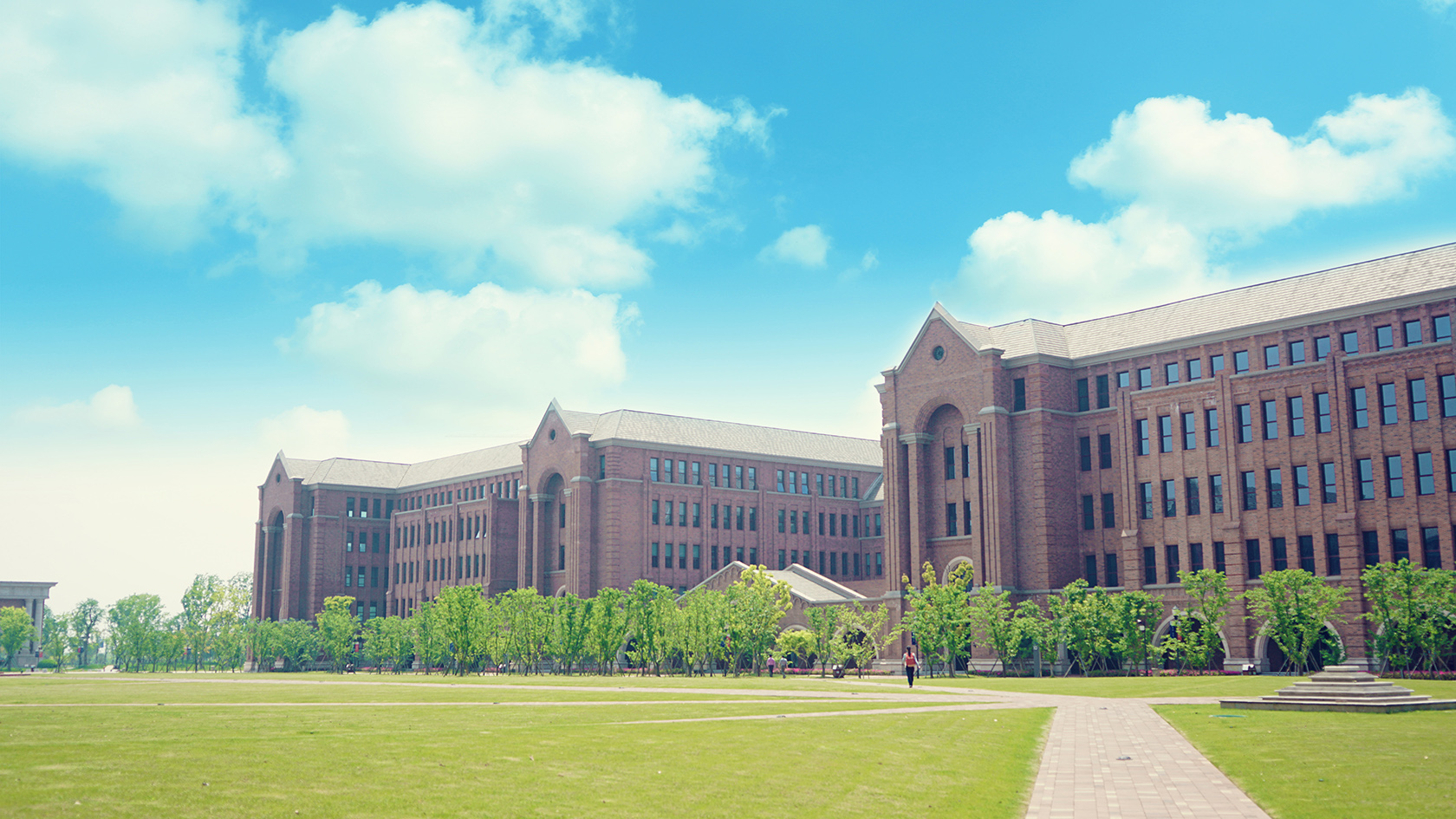Institute Profiles

Why established the ZJU-UIUC Institute?
Explore global collaboration for high education;
Break tradition boundaries, cultivating new engineering elites with cross-disciplinary knowledge;
Standing in China, blending Chinese and western Education, global views, cultivating international leaders.
ZJUI Overview
The Zhejiang University/University of Illinois at Urbana-Champaign Institute (the ZJU-UIUC Institute) is a new cooperatively-run engineering college on the new Zhejiang University (ZJU) International Campus in Haining, China. By introducing top engineering curricula and resources from UIUC, complemented with contributions from counterpart colleges and departments from ZJU, ZJU-UIUC Institute will provide a world-class engineering education. The institute is officially approved by the Ministry of Education, China on February 2016. ZJU and UIUC cooperatively cultivate undergraduates and graduate students. Currently, ZJUI has 518 undergraduates, 48 PhD candidates. Faculty of ZJUI is composed of talent recruited from top-tier international universities and outstanding professors from ZJU and UIUC.
1. Dual Degree
Students admitted to this degree program are enrolled in both Zhejiang University and the University of Illinois at Urbana-Champaign.
Students who successfully complete the program and meet the requirements of both universities will receive two bachelor’s degrees in their respective major fields:
▪Bachelor of Science from the University of Illinois
▪Bachelor of Engineering from Zhejiang University
2. Curriculum Features
Engineering classes and learning from the very first day. Conventional curriculum starts after two years
Joint courses that converge disciplines throughout the program, in every term
Cross-discipline advanced courses to provide a broad perspective
Design that transcends the disciplines
Ongoing creativity, entrepreneurship and leadership learning and opportunities
3. Interdisciplinary Innovation Cultivation
Today’s most important engineering challenges require expert teamwork across many disciplines. ZJUI students learn the deep knowledge and fundamentals that define their core discipline, and work together across all disciplines on design projects and comprehensive problems. Advanced classes in systems-oriented topics, student teams built around major international competitions, and visitors from all over the world help to demonstrate convergence and cooperation. Students are engaged in engineering challenges from their very first semester. The engagement in design and in broad engineering challenges begins immediately and progresses throughout the curriculum. By their final year, students are organizing and working on multidiscipline design teams to invent a solution to a problem they have chosen.
4. Elite Education
·First-class faculty members are recruited worldwide. Faculty members from ZJU and UIUC also participate in our programs. The undergraduate student-faculty ratio at ZJUI is no higher than 8:1.
·Faculty-student interaction is emphasized. Courses combine lectures, discussions, and experiments. Visitors and faculty are involved in an active seminar series. Laboratory facilities are built to follow the best global practices.
·We are seamlessly connected to our partners. Programs, curricula, core teaching materials, quality standards and outcome-based evaluations are drawn from our partners. Each curriculum features a broad range of courses and meets general education requirements of UIUC and of ZJU. All courses are taught in English.
·First-term students participate in Introduction to Engineering. This orientation and project course includes weekly seminars and team design activities. Elite scientists and engineers from academia and industry worldwide are invited to give seminars that broaden students’ horizons. Student teams study broad design challenges, presenting their proposals to the full group.
·We value the integration of theory and practice. We seek to build scientific foundations and address broad technology applications. We strengthen question-oriented learning, research, and practical training. Students participate in research projects both in the classroom and alongside faculty members and graduate students. We also provide a wide range of internship opportunities, and build our students’ capacity for innovation, invention and entrepreneurship.
5. Residential college model and All-rounded Cultivation
The International Campus emphasizes a Residential College housing system. Each residential college provides a friendly and supportive learning-and-living environment. Each student has a private bedroom, shared bathroom and common living space. Each College offers library facilities, study rooms, discussion and interactive spaces, laundry facilities, activity spaces, and fitness rooms. Each close-knit community serves as a microcosm of International Campus’s diverse student population, allowing students to have the cohesiveness and intimacy, the residential colleges are also the most significant in the everyday lives of ZJUI’s students. The colleges provide an exceptional opportunity to meet and learn from students, tutors and professors with different interests – people students might not otherwise encounter in their courses or extracurricular activities.
The Master of the Residential College, Professor Lap-Chee Tsui, is a famous educator who was President of the University of Hong Kong for 12 years. The Fellows, Tutors and Counselors in each College are ready to help students make the most of their learning experience, through general education, personal development, extracurricular activities, and events. The program seeks to help students become well-rounded people with knowledge, leadership skills, competence, creativity, morality, and individuality. A trained support team is available on campus 24 hours a day.
6. First-Class Campus
The International Campus provides faculty and students with a first-class environment for living and learning.
·First-class support and services are provided by the Campus Operation & Service Center and the Student Center.
·First-class teaching facilities include classrooms equipped with interactive integrated teaching systems, classrooms with flexible furniture and configurations, small meeting and discussion rooms, and world-class laboratories.
·First-class academic support through the library, outstanding information technology, and access to information and study facilities.
·First-class sports and activity facilities include music rooms, game rooms, a massive sports center, and student activity rooms.

University of Illinois at Urbana–Champaign
Founded in 1867, the University of Illinois at Urbana–Champaign (UIUC) is a public research-intensive university in the US. It’s a founding member of the Big Ten Conference and a member of the Association of American Universities. The university is also listed as a "Public Ivy". UIUC ranked number one in the Best Bachelors in Engineering Programs of the United States, published by the CollegeChoice.net. UIUC ranked 4th in 2015 Academic Ranking of World Universities in Engineering/Technology and Computer Sciences.
UIUC has a special relationship with China. As early as 1906, then-president edmond James wrote a letter to U.S. President Theodore Roosevelt, suggesting that the Boxer Indemnity fund could be used for the development of China's education. Later, it was developed into the boxer indemnity scholarship, by which many Chinese students were able to study in the United States. Between 1911 and 1920, the university of Illinois received and cultivated as many as 1/3 Chinese students who studied in the U.S., making it one of the most friendly American universities to Chinese students. The university is also one of the most diversified and international universities. In 2014, UIUC ranked the third in the number of international students in the United States and ranked the first among American public universities. UIUC currently has more than 47,000 students, including 12,454 international students, 1,005 teachers and more than 150 courses.

Zhejiang University
Zhejiang University (ZJU) is one of China’s top higher education institutions, as well as one of its oldest; its roots can be traced back to 1897 and the founding of the Qiushi Academy.
Located in Hangzhou – one of China’s most picturesque cities – the University is organized across seven faculties and 36 schools. It is home to 3,611 full-time faculty members, including 41 members of the Chinese Academy of Sciences and the Chinese Academy of Engineering. ZJU has 53,673 students, over 53% of whom are postgraduate students.
Laying claim to several areas of research strength, ZJU currently ranks among the top three on Chinese mainland and within the top 100 in the Times Higher Education World Reputation Rankings and QS World University Rankings. Eighteen disciplines of ZJU have been selected for China’s “Double First-class” Initiative (3rd in China) and 39 disciplines graded A in the recent national assessment (1st in China).
The University prides itself on a culture of innovation and entrepreneurship. ZJU researchers are making an impact across many priority areas that address global challenges, including artificial intelligence, assembly technology for large aircraft, clean energy, ocean technology, industrial control technology, and global public health initiatives related to the prevention and treatment of infectious diseases. ZJU is also renowned for the number of business start-ups it spins off. Over 100 of its alumni sit at the helm of domestic or overseas listed companies, making the University synonymous with excellence and leadership.
ZJU is committed to transforming China and the world through active engagement. Major innovative developments include the creation of a high-level platform for intellectual property exchange, as well as the formation of a number of think-tanks, including the China Academy of Western Region Development, the National Research Center for Agricultural and Rural Development, and the Institute for Public Policy, which exist to extend the scope of ZJU’s research in social sciences.
ZJU has partnerships in place with more than 180 institutions from more than 30 countries worldwide. Included among them are such leading institutions as Imperial College London, the University of Sydney and the University of Illinois at Urbana-Champaign.
With a cohort of 6,843 international students, and around 8,000 faculty and students who participate annually in various overseas mobility programs, ZJU fully harnesses its extensive network to nurture talent with a global outlook. In collaboration with the Universities of Edinburgh and Illinois it has also established the ZJU-UoE and ZJU-UIUC Institutes on Haining International Campus.
Chief among ZJU’s aims is the aspiration to become a world-class university with a distinctively Chinese character, where tradition and modernity are successfully combined.

